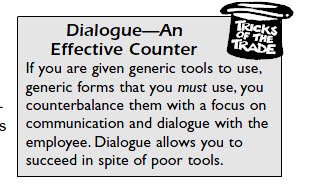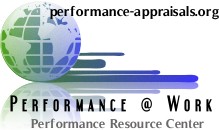Generic Review Tools and Mistaking Form With Function Fatal To Productivity
Generic vs. Specific Tools - General feedback from rating systems not enough to improve performance
There is a strong tendency for HR departments to want a consistent method for evaluating, reviewing, and documenting performance.
They have some valid reasons for wanting this, at least from their perspectives, since it helps them do their jobs and makes their lives easier.
Since personnel records (and usually documents related to performance reviews) end up with HR, they usually provide a standard form or set of forms for managers to use. Since the forms are “standard,” they are by necessity generic and not related specifically to any one particular job. In some cases, more sophisticated HR departments will provide different forms for managers and for janitors, for example, but nonetheless standardization is an important goal for HR departments.
The problem, though, is that a generic set of forms doesn’t
bring out or record information specifically enough to help
managers and employees improve performance. If managers
follow the form and the standard processes suggested or
required by HR and do only the minimum (completing the
form), the process becomes virtually useless. That’s because
general estimates of employee attitudes or skills aren’t going to
improve anything—although they are good at making employees
angry. To improve performance, you need specifics and
your employees need specifics.
 As a manager, you may be working with performance review
tools that are flawed and way too general. That’s a good example
of how your performance can be affected by an outside variable.
The solution, apart from lobbying to improve the tools, is to go
beyond them. Nobody requires you to limit your discussions during
performance reviews to only what is on the form. Get specific.
As a manager, you may be working with performance review
tools that are flawed and way too general. That’s a good example
of how your performance can be affected by an outside variable.
The solution, apart from lobbying to improve the tools, is to go
beyond them. Nobody requires you to limit your discussions during
performance reviews to only what is on the form. Get specific.
Forms vs. Process
Another feature that distinguishes between failed reviews and successful reviews is the emphasis: is it on completing the forms or on carrying out a productive and constructive practice?
One common complaint of both managers and employees
regarding performance reviews is that it seems like “one big
paper chase”: apart from getting forms completed, they don’t
see any purpose in it. Managers often set the focus on forms
both before and during review meetings. If the goal of performance
reviews is perceived as completing forms, it’s damaging.
